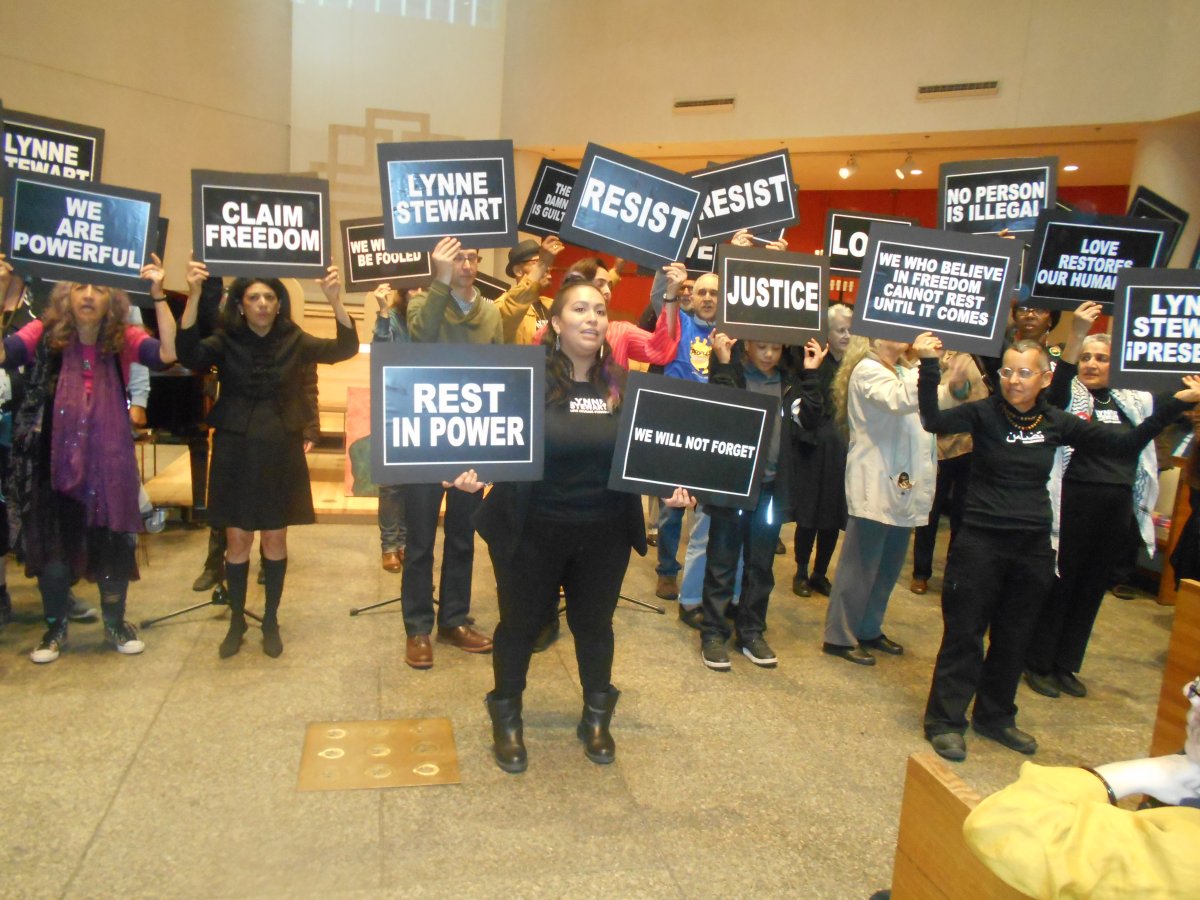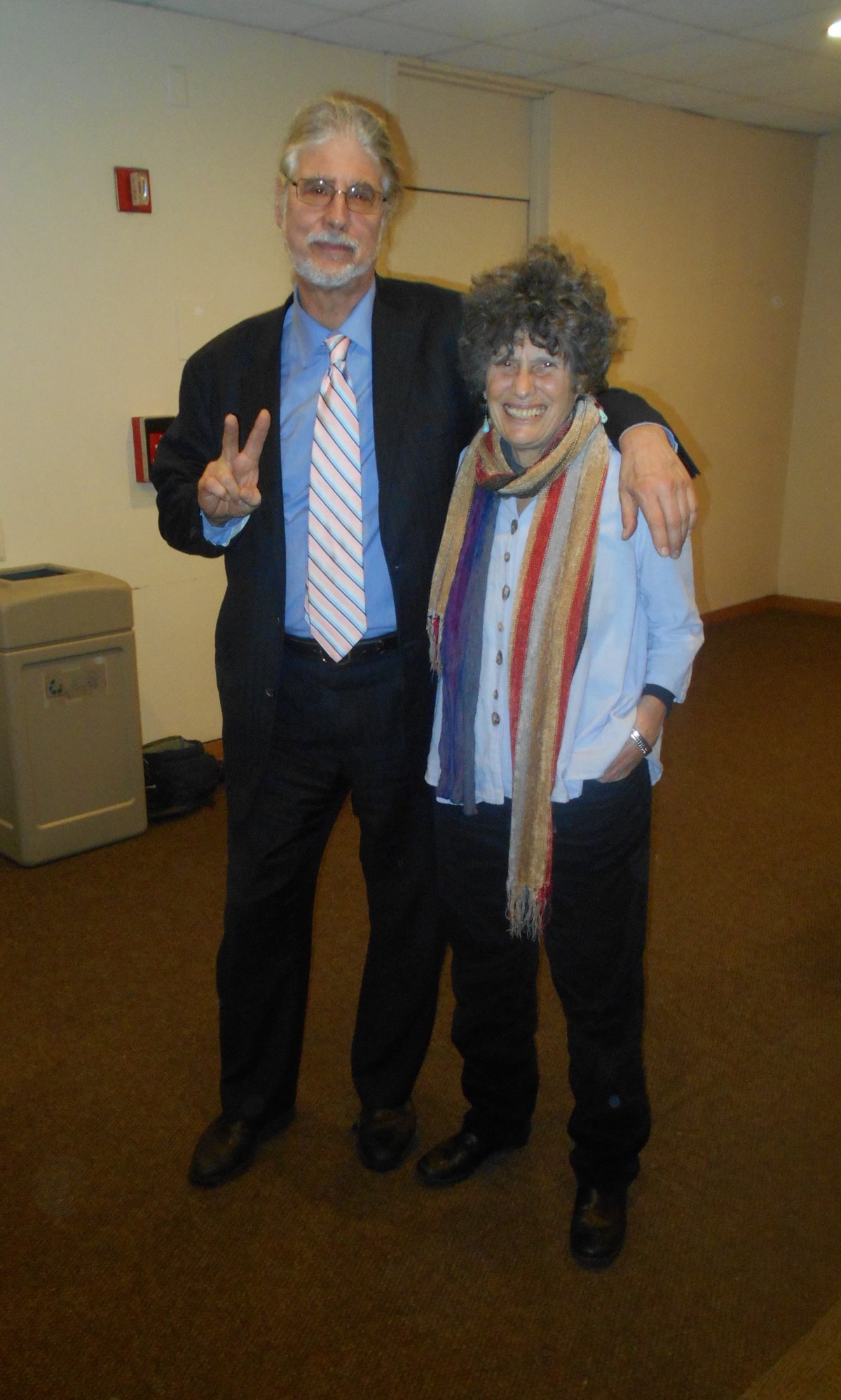
BY MARY REINHOLZ | A memorial celebrating the life of far-left icon Lynne Stewart drew about 300 people — some of them prominent radicals — to St. Peter’s Lutheran Church in Midtown last Saturday afternoon. They heaped praise on the disbarred Downtown “people’s lawyer,” who had done serious jail time for aiding terrorism. They eulogized her as a zealous advocate who fought ferociously for justice on behalf of the poor and unpopular — and had taken a bum rap along the way.
“What was she there [in prison] for? It was because she stood up against the forces of revenge and the forces that say, ‘Don’t cross us — or you’ll pay a price,’ ” said Reverend Lawrence Lucas. A black Roman Catholic priest, Lucas once clashed with Mayor Ed Koch, who had accused him of racist and anti-Semitic remarks when he was the pistol-packing pastor of Resurrection Church in Harlem during the 1980s.
“She had to pay a price like all of those who are fearlessly concerned about justice,” said Lucas, who went on to work at the city’s Department of Corrections. He noted that Stewart helped to gain a 1988 jury acquittal for Bronx cop shooter Larry Davis, who had faced an attempted-murder conviction for, as Lucas put it, “trying to defend his life against a group of thugs called police officers.”
Other speakers portrayed Stewart, an atheist who believed in armed struggle, as a secular saint.
“When the people who put Lynne in jail and their bones have turned to dust, Lynne’s [legacy] will live on!” thundered Newark activist Larry Hamm, chairperson of the People’s Organization for Progress as he addressed Stewart’s family, friends and supporters in St. Peter’s sacristy.
“Lynne Stewart was a people’s lawyer,” he said. “What does that mean? She was brilliant and could have worked on Park Ave. or Lexington Ave. or Fifth Ave. But she didn’t choose to do that. She didn’t choose to defend the powerful and the wealthy,” he continued to shouts of approval from the crowd. “She chose to be a servant of the people!”
Hamm, who called for the establishment of a scholarship fund to help prospective law students hoping to pursue “difficult” careers in Stewart’s line of work, described her 10-year sentence in 2009 as a “de facto” death penalty. Stewart’s trial judge in Foley Square had originally sentenced her to 28 months, but federal prosecutors successfully appealed his ruling.
Stewart, 77, died March 7 at her Brooklyn home, some three years after she was granted compassionate release from a Texas prison in late 2013 for her stage-four breast cancer. At that time, she had served about four years of her sentence —mainly for issuing a press release, in violation of prison rules, from one of her clients, imprisoned convicted terrorist Omar Abdel-Rahman, to his violent followers in Egypt.

The Muslim cleric, also known as “The Blind Sheikh,” died several weeks before Stewart did. He had been sentenced to life in solitary confinement for being the mastermind of the first terrorist attack on the World Trade Center in 1993, as well as conspiring to conduct multiple other bombings around the New York City area. Stewart, who believed Abdel-Rahman was innocent, wept in court at his 1995 conviction.
Left-wing journalist Chris Hedges, a former foreign correspondent for The New York Times and a Presbyterian minister, said Stewart “had a profound empathy for people who suffered.” He said her “epiphany” came in the early 1960s when she went to work as a teacher in Harlem, a community that she “didn’t even know existed,” as a middle-class young woman from Queens only 5 miles away. It was in Harlem, he said, where Stewart met her longtime second husband, Ralph Poynter, who was a teachers union organizer across the hall. It was, Hedges recalled, “at a time, as she said, when her skirts were as short as her hair was long,” a remark eliciting laughter from attendees.
Hedges said that any celebration of Stewart also had to be “a celebration of the life of Ralph Poynter and a celebration of their family.” Poynter, he added, encouraged Stewart to attend law school, noting she went on to defend the poor — “and all those that the state was trying to crush and erase.” (Her other controversial clients included members of the Black Panther Party, the Weather Underground and mob turncoat Sammy “The Bull” Gravano.)
The sacristy erupted with applause when Hedges claimed that Sheikh Omar Abdel-Rahman, her last major case, “had nothing to do with the 1993 attack on the World Trade Center.”
Meanwhile, he characterized Stewart’s own trial with two other co-defendants as “a show trial.”
Other speakers included Glen Ford, the executive editor of the Black Agenda Report, and Geoffrey St. Andrew Stewart, Stewart’s son from her first marriage, who is also a criminal defense lawyer. New Jersey visual artist Ruth Bader Neustader spoke a few minutes about the picture she painted of Stewart while Neustader was a volunteer for WBAI, noting that she is giving it to Stewart’s family. Poynter held it aloft amid cheers and pounding drums.
At one point during the memorial at the so-called “Jazz Church,” at Lexington Ave. and E. 54th St., about 50 of Stewart’s supporters entered St. Peter’s sacristy singing and carrying signs with messages like “Rest in Power,” “Resist” and “Justice.”
One of the organizers of the event was the International Action Center, a volunteer organization co-founded by Ramsey Clark, a former U.S. attorney general. Clark had represented Abdel-Rahman and asked Stewart to defend him at his trial.
Attendees first gathered on a lower level of St. Peter’s, where there was food and beverages laid out on long tables, along with images of Stewart resurrected on a screen as she recalled her life and her struggles in a disembodied voice.
People introduced themselves to newcomers and mingled with old friends. The Villager spotted leftist royalty in the crowd, such as civil-rights attorney Ron Kuby, who had briefly represented Abdel-Rahman with Kuby’s late West Village partner Bill Kunstler. This reporter snapped a photo of Kuby with former Weather Underground leader Kathy Boudin, who spent 22 years in jail for her role in the infamous 1981 Brink’s armored-car robbery in Nyack, which led to the shooting deaths of a security guard and two police officers.
Boudin, now 73, teaches at Columbia University. She declined to comment for this article.

































